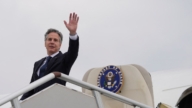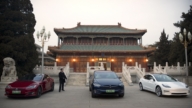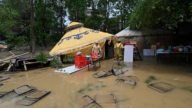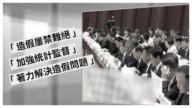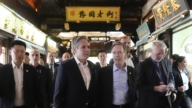【新唐人2013年02月16日訊】圍繞釣魚島的主權爭端,中共態度之強硬和對峙時間之久,令許多人始料不及。不過,有學者表示,中共的強硬態度,與過去一年來高層的權力鬥爭緊密相關。同時,一項數據顯示,去年赴日的外國遊客中,中國遊客的人數卻是歷年最多。
繼日本方面指稱,中共海軍艦艇使用火控雷達瞄準日本艦船和飛機後,中共各大軍區的海陸空和二炮部隊連日來加緊備戰。14號,共六艘中國海監船編隊繼續在釣魚島附近海域巡航。而《中央電視臺》首次以直播方式,高調曝光船隊巡航,以及近距離拍攝釣魚島的片段。
日本《共同社》引述日本海上保安廳的消息說,海監50船曾要求附近日本船艦離開釣魚島中國領海。
而據《日本新聞網》報導,日本自衞隊日前與美國海軍陸戰隊,在加州彭德爾頓基地舉行聯合奪島演習,模擬釣魚島遭佔領後,日美聯手奪島,50名陸上自衞隊員更首次搭乘美軍魚鷹運輸機進行空降。
北京時政觀察人士華頗:「打不起來!所以他們(中共)就高調宣示,一是對內,對內爭取民眾的支持,表現越強硬國內的民族主義越支持他。對外,有抗衡美日同盟的意味。 估計中日還要恢復以前的『政冷經熱』,在政治上高調喊打喊殺,在經濟上還要『密切合作』。」
《美國之音》的報導引述日本東京大學東洋文化研究所松田康博的話表示,東京都知事石原慎太郎購買釣魚島計劃,演變成國有化事件,是中日島嶼爭端的導火索,但同一時期的中共高層權力鬥爭和權力交接,激化和深化了中共與日本的矛盾。
松田康博說,中共的權力交接仍在繼續,一直到今年三月全國人大開會。一些部門主管官員看著上級的臉色,猜測紛紛,而最終他們選擇了強硬政策。因為在權力交接時期,人們往往選擇比較強硬的對外政策。
美國中文雜誌《中國事務》總編伍凡指出,即使在兩會後,中共的內部權鬥也一直存在。所以釣魚島問題和權鬥有關,但不絕對。
美國中文雜誌《中國事務》總編伍凡:「更大的(原因)是民族主義。因為老百姓壓著他們。民族主義是共產黨把它興起來的,現在老百姓指責你們(中共):你不作為,你就是賣國賊。所以沒有一個人敢退步,敢示軟。所以民族主義顯示出來的力量,可能超過黨內鬥爭。」
與此同時,《央視網》援引日本國家旅遊局的數據報導說,2012年赴日的836.8萬外國遊客中,中國遊客約有143萬人,為歷年最多。
伍凡:「中國老百姓比較理智的去對待日本。不僅看到歷史,也要看看現在,究竟日本人對中國是怎麼樣的。 據我看到一個資料,百分之五十多、六十的日本人,不想跟中國人打仗。你光看一個是共產黨喊要打,日本的右派要喊打,美國制止說你們不要打,所以這個戰爭不一定會打起來。但是叫喊、軍隊準備要打仗,這個是不會放鬆的。」
有網友(cooker)認為,央視的這則消息很諷刺:「這臉打的啪啪啪。」
華頗:「反日是一時的。但是這種狂熱情緒是保持不了多久的。那種熱情一過,當然是一切如常了。該玩還是要玩,該去日本還要去日本。」
中國權利運動發起人胡軍:「官方一再反日,喊這麼兇,其實民間偏偏這時候願意到日本去。還有一種情況,就是官員們大量貪污的公款、民脂民膏沒地方花,所以現在出去公費旅遊的特別多。」
胡軍指出,這些中共官員們一方面高喊反日,一方面他又跑到日本去高消費。所以真正的敵對勢力、賣國賊,正是這些中共官員。
採訪/李韻 編輯/王子琦 後製/李智遠
Sino-Japan Islands Dispute Intensifies,
CCP Senior Officers Struggle for Power but Chinese Still Visit Japan
In the territorial dispute over the Diaoyu (Senkaku) Islands,
the tough attitude of the CCP and the long term confrontation exceed what many had expected.
However, scholars have said the CCP’s tough attitude is closely
related to the internal power struggle of the past year.
At the same time, an investigation shows that the number
of Chinese who visited Japan in the last year is higher than in the past.
Since the Japanese said the CCP’s navy had used fire control
radar to target Japanese ships and aircraft,
the entire armed forces of each CCP military region, including
the Second Artillery Force, are engaged in war preparations.
On February 14, six Chinese ocean surveillance ships cruised
around the Diaoyu (Senkaku) Islands.
CCTV also broadcasted live coverage of the cruise,
and a close up view of the Diaoyu (Senkaku) Islands for the first time in history.
Japan Kyodo News quoted the Japan Coast Guard report that
the Chinese Surveillance ship had asked the Japanese ships
to leave China’s territorial waters in the Diaoyu area.
According to the Japan News Network, the Japanese
Self-Defense Force (JSDF) and the U.S. Marine Corps
held a joint resizing island military exercise in
Pendleton base California, U.S..
It was to simulate the two forces resizing the
Diaoyu islands after they had been occupied.
During the exercise, 50 JSDF soldiers did an airborne landing
from a U.S. Osprey transport aircraft, this is a first in history.
Hua Po, Beijing political observer: ”There won’t be a war!
That’s the reason why CCP has declared itself in high profile.
On the one hand, it wants to have
people’s support inside China.
It will have more support from domestic nationalism
if it shows a tougher attitude.
In addition, there has been a demonstration of
an anti US – Japan alliance.
I guess the Sino-Japan relationship will go back to
the political cold, but not in economic considerations.
Politically, the CCP shouts of beating and killing, but
cooperates closely with Japan where economy is concerned.”
The Voice of America quoted Matsuda Compro who is from
the Institute of Oriental Culture, University of Tokyo.
The purchasing of Diaoyu islands plan by Shintaro Ishihara,
the Tokyo Governor, changed into a nationalization event, this lit the fuse of the Sino-Japan islands’ dispute.
But the power struggle of CCP senior leaders and the power
transference itself intensified and deepened the contradictions between the CCP and Japan in the same period.
Matsuda Compro said the CCP’s power transfer can’t be done
before the National People’s Congress in March this year.
Some of the main officials responsible are behaving by
looking straight into their leader’s faces.
Finally, they have chosen a tough attitude. This is because,
during the power transfer, in general, people prefer to choose a relatively tough foreign policy.
Wu Fan, the chief editor of the U.S. Chinese magazine
China Affairs pointed out that even after the two sessions,
the internal struggle within the CCP has remained.
So the Diaoyu Islands’ issue is related to the internal struggle,
although not completely.
Wu Fan: “the greater reason for this state of affairs
is nationalism, which has brought pressure from the people.
Nationalism is created by the CCP. Now the people blame
the CCP: if you don’t take action, you are a traitor.
That’s why nobody dares to step backward,
nobody dares show weakness.
So, the power of nationalism may well exceed
that of the CCP’s internal struggle.”
At the same time, CCTV network quoted data from the
Japan National Tourism Administration that in 2012,
among 8.368million foreign visitors,
there were about 1.43 million Chinese.
This is the largest figure recorded in history.
Wu Fan: “Chinese people are treating Japan with rationality.
They balance history and today to judge what attitude Japanese people have toward China.
I have read data that claims that over 50%to 60% of Japanese
don’t want to fight with the Chinese.
The CCP has shouted to fight and the right-wing of Japan
talks about fighting, but the U.S. said don’t fight.
So there shouldn’t have been any likelihood of war.
But the shouting and military preparation have
gained momentum and won’t be easily stopped.”
Some netizens thought CCTV’s message very ironic.
“The slap in the face made a loud noise.”
Hua Po: “Anti-Japanese tirades are a temporary action.
This kind of enthusiasm can’t last for a long time.
When the enthusiasm is gone,
everything will go back to normal.
When people want to travel for fun, they will travel.
Those who need go to Japan will go,
regardless of the situation.”
Hu Jun, founder of China Human Rights Campaign:
“The CCP repeatedly encourages anti-Japanese feeling,
the shouting is so fierce, but people still went to Japan.
There’s another fact. Lots of officials have embezzled
so much money from people, but don’t have a place to use it.
Then there are so many people who travel out of China
by spending public funds.”
Hu Jun, found of China Human Rights Campaign pointed out
that CCP officials shouted anti-Japan on the one hand,
but they traveled to Japan and spent a lot of money there.
So it’s very clear that the real hostile forces and traitors
are those CCP officials.



